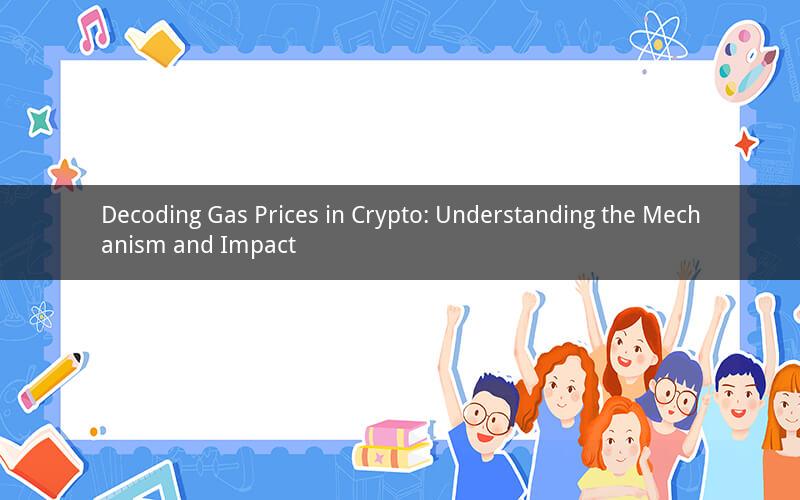
Introduction:
In the world of cryptocurrency, gas prices play a pivotal role in the functionality of blockchain networks. Whether you're a beginner or an experienced investor, understanding what gas prices in crypto are and how they affect your transactions is crucial. This article delves into the intricacies of gas prices, their role in the blockchain ecosystem, and the factors that influence them.
1. What are Gas Prices in Crypto?
Gas prices in crypto refer to the cost associated with executing a transaction on a blockchain network. It is a measure of the computational effort required to process a transaction, and it is denoted in the cryptocurrency's native token, such as Ether (ETH) for Ethereum.
2. The Role of Gas Prices in the Blockchain Ecosystem
Gas prices serve several essential functions within the blockchain ecosystem:
a. Incentivize Miners: Gas prices compensate miners for their computational efforts in validating and processing transactions. Higher gas prices incentivize miners to prioritize transactions with higher fees.
b. Allocate Resources: Gas prices help allocate computational resources efficiently. By adjusting the gas price, users can prioritize their transactions and ensure they are processed faster.
c. Encourage Scalability: Gas prices can influence the scalability of blockchain networks. High gas prices can lead to congestion, while low gas prices may result in slower transaction speeds.
3. Factors Influencing Gas Prices
Several factors can influence gas prices in crypto:
a. Network Demand: The higher the demand for blockchain resources, the higher the gas prices. When there is a surge in transaction volume, gas prices tend to rise.
b. Network Congestion: High levels of network congestion can lead to increased gas prices. This is because miners prioritize transactions with higher fees to process them quickly.
c. Block Size Limit: The block size limit of a blockchain network can impact gas prices. When the block size limit is reached, new transactions are queued, and gas prices may rise.
d. Transaction Complexity: Transactions that require more computational effort typically have higher gas prices. This includes smart contracts and complex transactions.
4. The Impact of Gas Prices on Users
Gas prices can have a significant impact on users in several ways:
a. Transaction Costs: Higher gas prices increase transaction costs, making it more expensive for users to send and receive cryptocurrencies.
b. Transaction Speed: Users can pay higher gas prices to prioritize their transactions and ensure faster processing times.
c. Smart Contract Development: Developers of decentralized applications (dApps) must consider gas prices when building their applications. Higher gas prices can make it more expensive to deploy and run smart contracts.
5. How to Minimize Gas Prices
To minimize gas prices in crypto transactions, users can:
a. Use Layer 2 Solutions: Layer 2 solutions, such as Optimism and Arbitrum, offer lower gas prices by offloading some of the computational load from the main blockchain.
b. Batch Transactions: Users can combine multiple transactions into a single batch to reduce transaction costs.
c. Choose Off-Peak Hours: Executing transactions during off-peak hours can lead to lower gas prices.
Q1: How do gas prices differ between different blockchain networks?
Answer: Gas prices can vary significantly between different blockchain networks due to factors like network demand, congestion, and block size limits. For example, Ethereum has higher gas prices compared to Bitcoin due to its higher transaction volume and complexity.
Q2: Can gas prices be manipulated by users?
Answer: While users can influence gas prices by adjusting their transaction fees, they cannot manipulate gas prices directly. Gas prices are determined by the market forces of supply and demand.
Q3: What is the purpose of gas limit in crypto transactions?
Answer: The gas limit is the maximum amount of gas a transaction can consume. It ensures that transactions do not exceed the computational limits of the blockchain network and prevents malicious actors from exploiting the system.
Q4: How do gas prices affect the scalability of blockchain networks?
Answer: High gas prices can lead to network congestion and slower transaction speeds, which hinders scalability. Conversely, lower gas prices can encourage more transactions and improve network efficiency.
Q5: Are there any benefits to paying higher gas prices?
Answer: Paying higher gas prices can ensure faster transaction processing and reduce the risk of your transaction being stuck in a queue. However, it is essential to balance the cost with the importance of the transaction.